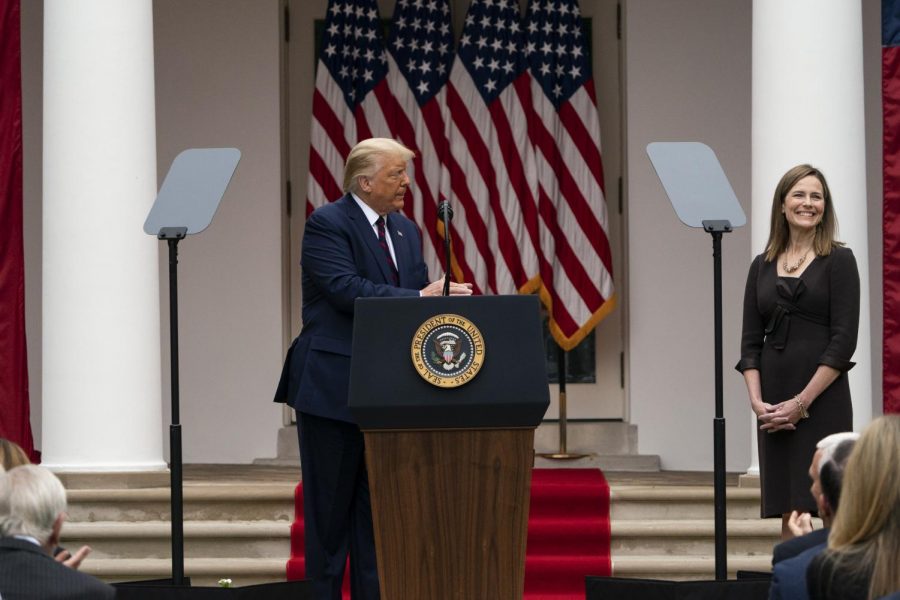Don’t let political games distract you
President Donald Trump speaks as he announces Judge Amy Coney Barrett as his nominee to the Supreme Court. (AP Photo/Alex Brandon)
Oct 2, 2020
Americans are honoring the life and legal career of Justice Ruth Bader Ginsburg following her passing. Simultaneously, the nation is being introduced to the woman who will likely take the late justice’s seat on the U.S. Supreme Court.
To the excitement of conservatives, the U.S. Court of Appeals for the Seventh Circuit Judge Amy Coney Barrett was officially nominated for the Supreme Court Saturday afternoon by President Donald Trump. Barrett, a former clerk and jurisprudence disciple of the late Justice Antonin Scalia, is seen as someone who will shift the ideological makeup of the Supreme Court. If confirmed, the court will hold six justices appointed by Republican presidents and three by Democratic presidents.
As the nomination battle unfolds, most media coverage has been focused on the political circus happening in Washington. Both sides have engaged in hypocrisy and altered their opinions on appointing a Supreme Court justice during an election year. To me, this is nothing new. We should not be shocked that a politician from either party stated something four years ago and has now decided to take the opposite approach after it benefits them. We should also not be shocked that the Senate Republicans are moving forward as history favors filling the seat. Democrats would do the same. There are, however, broader implications embedded within this confirmation battle that require greater attention.
Since 1869, the Supreme Court has had a panel of nine justices. In the past, we have seen calls to expand the size of the court. These calls have predominantly originated from the Democratic Party as they seek to adjust a court that is, to them, unsatisfying. In recent months, there has been a revival of this approach, coming again from the losing side, which has gained momentum following the court’s fresh vacancy.
Senate Minority Leader Chuck Schumer said “nothing is off the table” if the Republicans move forward with the nomination process of Barrett before the election. This type of language can be seen as a political threat: Do not use your constitutional ability to fill the vacancy, otherwise, we will punish you after we acquire power.
In the past, Democratic presidential nominee Joe Biden has been opposed to packing the court. Recently when asked about this stance, he stated, “If I were to say yes or no to that, that becomes a big issue. That’s the headline here.” Biden is attempting to dodge a question, as he has throughout much of his campaign, to keep the radicals within his coalition satisfied. Whether Biden could be manipulated by the left is up for debate, but because his running mate is ranked the most liberal United States Senator, one has to wonder if radical leftists will be running the show in a Biden administration.
How will Democrats achieve such goals of court expansion? By eliminating the filibuster. This would allow them to shove legislation through both chambers of Congress, ultimately expanding the capacity of the Supreme Court.
A filibuster is a tool used in the Senate, typically by the minority party. It creates gridlock, allowing for the refinement of public policy. To pass legislation in the House, all you need is a simple majority. In the Senate, you need 60 of 100 votes to end a filibuster, which allows business to continue being conducted. This mechanism was created to foster debate and compromise in the world’s greatest deliberative body.
Taking the filibuster away would allow Democrats, if they controlled both chambers of Congress and the White House, to cram down their policy agenda with a simple majority. The founders explicitly opposed mob rule, which consists of 51% of the population telling the other 49% how they ought to live. Our Senate, our federalism, our checks and balances are supposed to be a bulwark against such a system.
Not only would we see an expanded Supreme Court, but we would see an attempt to abolish the Electoral College, leading to major cities deciding the fate of every presidential election. We would see statehood being granted to the District of Columbia and U.S. territories in a ploy to acquire more Democratic seats in the Senate.
There are plenty of bipartisan improvements that could enhance the functions of our Senate. Discarding the filibuster as a means of achieving Democratic wish lists is not the answer Americans need.
Several members of the Republican Party wish to diffuse tensions by negotiating with Democrats that seek to accomplish these goals. They must refrain from such negotiations.
Anyone willing to threaten the use of political force to cram down policies on the American people as a retaliation of not getting their way should never be trusted. There is no negotiating when politicians wish to implement mob rule. There is no negotiating when taking a constitutional avenue is met with the desires of complete governmental takeover.
As I reference my pocket Constitution, I can cite powers given to the president and Senate in Article II Section 2: “He shall nominate, and by and with the Advice and Consent of the Senate, shall appoint Ambassadors, other public Ministers, Consuls, Judges of the supreme Court, and all other Officers of the United States.”
The Senate is controlled by Republicans. The executive branch is functioning under a Republican administration.
Fill the seat.













